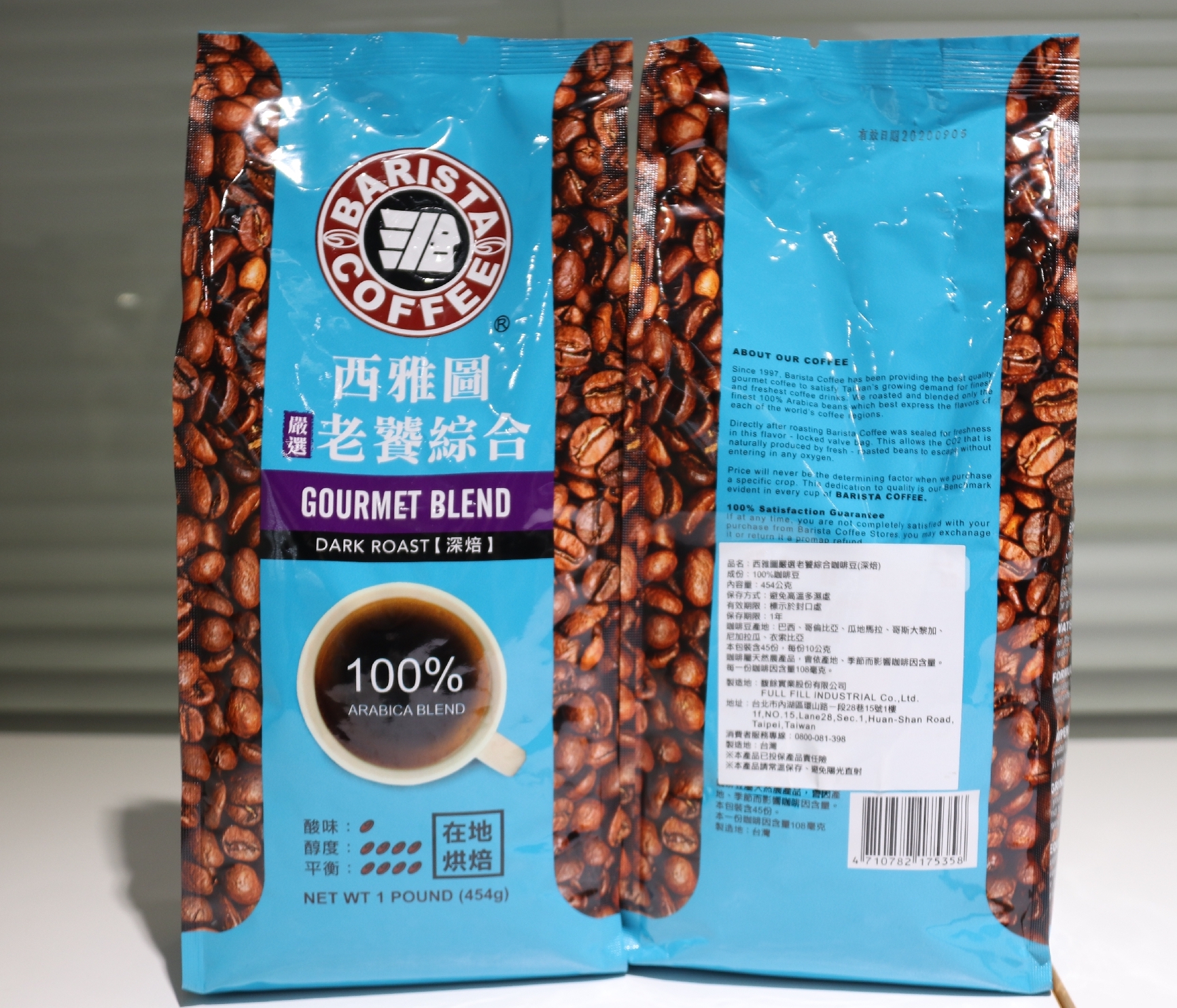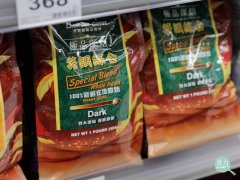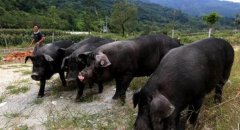Are all the coffee on the market 100% Arabica beans? Disassemble the coffee bean supply and watch it.
Arabica has a specific use, and there is a very obvious difference in taste between Arabica, which is generally used in instant solution, or in lattes to increase the thickness of alcohol.
What you should know about food.
Apart from the fact that some of Taiwan's domestic raw bean merchants will go to the local market on their own, almost all of them will buy coffee beans with large international raw bean manufacturers. However, the process of marketing is full of various kinds of factors, so domestic raw bean merchants need to implement quality control.

Cai Xingru, Luo Xinpei, Jing Jingxiang
Write the article = "Jing Xiang"
When it comes to imported coffee and raw beans, what's the first thing that comes to mind? Do you think the coffee bars or packaged coffee sellers in Taiwan are all raw beans that are processed directly with the local and local coffee sellers? It's not really.
When it comes to the possibility of mixing 100% Arabica beans with low-fat Busta beans, the major domestic raw bean merchants, including Shoucheng Food Materials Co., Ltd., Yuanyou Coffee Co., Ltd., and Yuanyou Enterprise Co., Ltd., all gave a corresponding affirmative answer: "raw bean merchants will not do such self-destructing signboards!" "Why can you give such an answer so confidently? Is this true? When brands want to buy coffee beans from raw bean merchants, how can they not be cheated?
An important link in coffee bean trading: raw bean merchants
In the market for raw coffee beans, there are roughly several types of coffee beans, namely "commercial coffee beans" and "boutique coffee beans (Specialty Coffee)". The output of commercial coffee beans is large, and they are sold according to the market conditions of the national market. If high-quality coffee beans are directly called "specialty coffee beans" in English, they have a stronger special flavor than commercial beans, and they have been popular in Taiwan's market in recent years.
According to the type of imported raw beans, Taiwan's raw bean merchants can be divided into "Shoucheng" and "beans" dominated by commercial beans, and "beans" and "Black Gold Fine Coffee roasting Co., Ltd.," with the former not only supplying to coffee shops, but also to packaged coffee shops, while the latter are mostly supplied to coffee shops for fresh brewing. In addition, Yuanyou Enterprise Co., Ltd., which has the largest roasted beans in Taiwan, and UCC, the Japanese coffee maker, are also Taiwan's main suppliers of ripe coffee beans, supplying to those who are linked to supermarket stores, packaged coffee bars, and so on. Because of the demand for output, they also import a large number of raw beans themselves.
However, except for some of Taiwan's domestic raw bean merchants who go to the local market on their own, almost all of them will buy coffee beans with large international raw bean manufacturers. Why did this happen? The truth is that it is for the purpose of dispersing the masses. "the international trade of these very large-scale goods is the volume of transactions at the level of 10,000. If you think about it, it can be operated to more than 10,000 level, indicating that it has reached a certain level of control and control in the production area. Zhu Maoheng, manager of Yuanyou's boutique department, explains that this kind of cooperation is the first of its kind. Not only is the price low, but it can also be remarried, and the payment and refund mechanisms are more mature. More importantly, there is no need to worry about problems.
Generally speaking, domestic raw bean merchants will buy raw beans from Chinese raw bean merchants according to the needs of their customers, and import them to Taiwan by way of sea. But there is another import practice: Mitsui products Co., Ltd., a Japanese merchant, is also one of the major importers of raw beans in China. The way he buys beans is different from that of other raw bean merchants. He will first put the raw beans from the sea to Taiwan in a warehouse, and then those who are qualified to import them will go to buy the raw beans and obtain approval before they can get the raw beans.
Fill up the number of people! The tested goods may not be in conformity with the received goods.
However, there are many kinds of factors in the process of training. Shou Cheng manager Weng Jiexiang shares that the classification of coffee beans that we often see is really a way for commercial beans. Each country and region will classify coffee beans according to their own standards such as defect rate, altitude, density, and so on. However, there will be a lot of A-grade goods and we will receive inferior goods.
Since we are working with trustworthy Chinese raw bean merchants, why do we still encounter such a situation? Chen Yun-Yi revealed that such speculative conditions are more common in Asia than in mainland China, so domestic raw bean merchants all the more need to implement quality control.
How can raw bean merchants manage this foreign trade that has been going on for months?
Zhu Maoheng revealed to us the complete import process of raw beans:
Step 1: first of all, the test products will be sent to the request of Chinese raw bean merchants, farmers, etc.
Step 2: make a cup after the product comes to Taiwan, and further report if you meet the requirements.
Step 3: for the first time, there will be a small amount of raw beans, such as a green bean.
Step 4: before getting on board, raw bean merchants must first provide PSS (pre shipment sample) of pre-cooked coffee beans, and bake beans and cups again to confirm the situation before they are qualified.
Step 5: samples will be taken again when we arrive at the port. Compare the previous PSS results, and if the difference is too big, we will reject it.
Horie Chang Ping, general manager of UCC, said that UCC has separate quality testing rooms in the two major production regions of Brazil and Vietnam. In addition to the quality control of the place of origin, coffee beans will also be sold at the local level before being exported, making sure that the guaranteed products meet the requirements of the list again.
How can the raw bean merchants who go directly to the production areas sell the related products?
Have you ever heard of "peas" or "beans" in the coffee industry? The soy beans are actually experts sent by raw bean merchants or coffee makers to go deep into coffee shops and producing areas all over the world to pick raw beans. As a matter of fact, this group of experts is also an important concern of the raw bean merchants who directly produce the beans.
As a matter of fact, the concept of "soy beans" comes from the coffee farmers who buy coffee. He says that since 2001, he has been going directly to the producing areas for coffee production, and what he relies on is that soy beans use their own specialty to work in the producing areas. In addition, "stuffed beans" are also the source of raw beans, which are actually the ones that win the championship in the cup, and they often buy them in a good way. These "champion beans" are not only popular, but also can be traced back to the source, so it is impossible to fake them.
Yu Jiazi, who is also a mojocoffee buyer at the same time, says that "black gold" has soy beans in many countries, and raw beans will also be served first. In addition, mojocoffee baked beans will not only bake their own beans, but also appoint large-scale and reliable contract manufacturers to bake beans in China.
Are raw bean merchants fooling around? Downstream merchants are also very professional and professional!
Is it possible for raw bean merchants to mix Busta beans with Arabica beans and give them to customers? Shou Cheng, Shou Cheng, Heijin and other raw bean merchants almost all said it was impossible! For experts, the difference in raw beans between Arabica beans and Chambusta beans is so obvious that they can be directly identified with the naked eye. The coffee maker Chong Chong even said that if a cup of coffee noodles contains more than 5% of the spaghetti, you can drink it. "downstream merchants are very professional, so it is impossible to do so. However, he also points out that if the downstream is not professional and unable to identify the differences of several kinds of beans, there may indeed be the possibility of being deceived by unscrupulous businessmen.
How do brands turn their backs on themselves? No matter what the raw bean merchant does, so should the brand!
In terms of raw beans, downstream brands should also have a closed mechanism, and those who should not be invited should accept it! Liao Guoming, representative of the boutique coffee shop and director and director of Zhanzhan Coffee Coffee, said that just as domestic raw bean merchants make cups before and after receiving raw beans, Zhanzhan will use the same steps when they receive raw beans.
- Prev

Why is it claimed that Arabica beans can be sold at a high price? What are the benefits of coffee adulteration?
As early as a few years ago, 100% Arabica suddenly appeared, in fact, this situation is for commercial coffee beans, while in the boutique coffee industry, 95% of the boutique coffee beans are Arabica coffee beans, because Shangchao Coffee is originally.
- Next

Shaanxi Hanzhong Liuba native pig chicken obtained SEIC organic certification.
Shaanxi Hanzhong Liuba pig native chicken obtained SEIC organic certification, and native pig and native chicken produced by Liuba County Shancheng Nongte products Co., Ltd. obtained SEIC organic product certification, which indicates that Liuba native pig and native chicken are all natural and pollution-free from provenance breeding to production and processing.
Related
- A one-day flower show brings 130 million yuan in orders! Nanhai, this Phalaenopsis exhibition is amazing
- What do the flower language and meaning of Lutheran tree mean? Precautions for planting Lutheran tree
- Encounter Chaoshan Kongfu tea, not without this cup of Phoenix single clump
- The durian market in Vietnam and Thailand is flooded. The price of imported durian has plummeted by 30-40% in a month.
- Shanghai solved the problem of local vegetable supply by planting 80,000 mu of green leafy vegetables.
- Wageningen University has become the best agricultural university in the world for the seventh time in a row.
- The strongest export season of South African grapes is full of challenges, with exports to Russia falling sharply by 21%.
- Sri Lanka is on the verge of bankruptcy, "Tea for debt" Organic Agriculture Revolution aggravates the Food crisis?
- Turning waste into earthworm manure and worm manure into organic fertilizer-A new choice for auxiliary farming
- Organic rice growers shoulder the responsibility of nurturing agricultural talents! Yinchuan Sustainable Farm with Organic Life Camp

